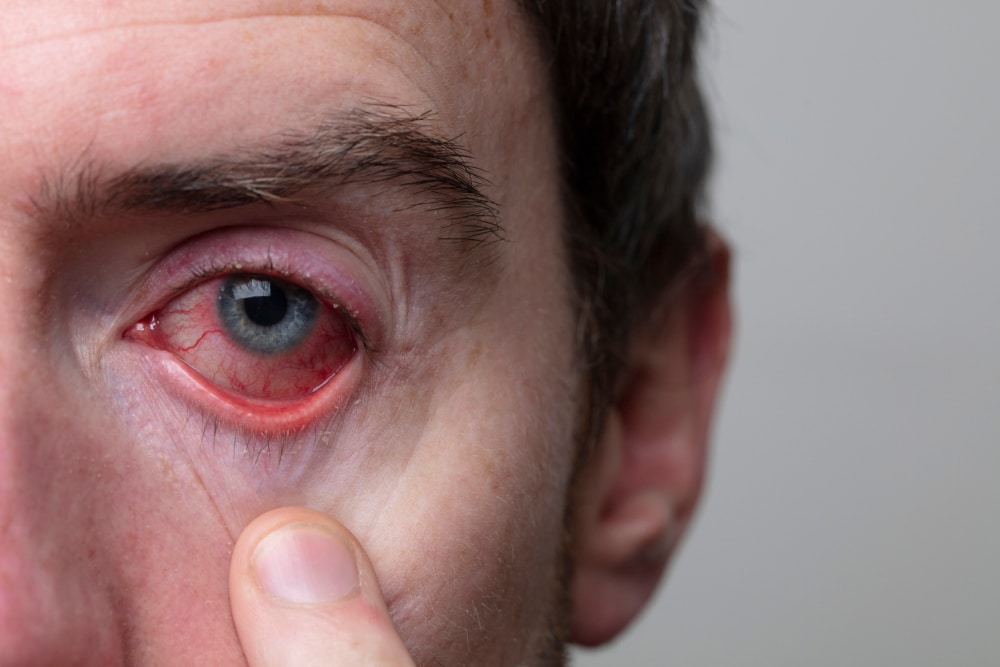
Uveitis Symptoms
Uveitis can present with various issues in one or both eyes. Common symptoms include:
- Eye Redness: This is one of the most noticeable signs.
- Eye Pain: This discomfort may affect daily activities and overall well-being.
- Blurry Vision: This is a frequent complaint among patients. Inflammation can distort vision.
- Spotty Vision: Patients might see floaters or spots in their line of sight.
- Light Sensitivity: This symptom is known as photophobia. It makes it uncomfortable to be in bright light.
- Decreased Eyesight: Severe uveitis can lead to significant vision loss if not treated promptly.
Uveitis Causes
Uveitis can have several causes. They are often categorized into infectious and non-infectious origins. Some of the most well-known reasons for this condition include:
- Autoimmune Disorders: Conditions like lupus, rheumatoid arthritis, and ankylosing spondylitis can trigger uveitis.
- Infections: Bacterial, viral, fungal, and parasitic infections can cause uveitis.
- Injury or Trauma: Physical eye damage can lead to inflammation.
- Genetic Factors: Some genetic predispositions can increase the likelihood of developing this condition.
Uveitis Diagnosis
Diagnosing uveitis starts with a thorough eye examination. A detailed patient history follows the exam to identify underlying disorders or triggers. From here, the diagnostic process typically involves:
- Visual Acuity Testing: This test measures your eyesight at various distances.
- Slit-Lamp Examination: A microscope with a bright light is used to look at the structures in the front of the eye.
- Ophthalmoscopy: This allows the doctor to examine the back of the eye. The exam includes the retina and optic nerve.
- Imaging: Physicians may use optical coherence tomography (OCT) or fluorescein angiography to get detailed images of the eye structures.
- Laboratory Testing: Doctors may order blood or skin tests to identify systemic illnesses.

Uveitis Treatment
Uveitis treatment reduces inflammation, relieves pain, and addresses the root cause. Common solutions include:
- Corticosteroids: Physicians can administer these anti-inflammatory medications as eye drops, oral tablets, or injections.
- Immunosuppressive Drugs: Our physicians may prescribe medicines that suppress the immune system for severe or chronic cases.
- Antibiotics or Antivirals: We will use appropriate antimicrobial drugs if an infection is the cause.
- Mydriatic Eye Drops: These help dilate the pupil and relieve pain by reducing muscle spasms in the eye.
- Surgeries: In rare cases, surgical procedures might be necessary to treat complications or to inject medication directly into the eye.
FAQs
Can Uveitis Be Cured Completely?
Treatment can effectively manage and reduce symptoms. However, uveitis can sometimes be a chronic condition that requires ongoing care to prevent recurrences and complications.
What Are the Long-Term Effects of Untreated Uveitis?
Untreated uveitis can lead to serious issues, such as:
- Glaucoma
- Cataracts
- Macular edema
- Permanent vision loss
Early intervention is crucial to prevent these outcomes.
Is Uveitis Contagious?
Uveitis itself is not contagious. However, if it is caused by an infectious agent such as a virus or bacteria, the underlying infection may be contagious.
Can Lifestyle Changes Help Manage Uveitis?
Lifestyle changes alone cannot cure uveitis but can support overall eye health. Maintaining a healthy diet, managing stress, and avoiding known triggers are all good complements to medical treatments.
Why Choose Central Valley Eye Medical Group?
The Central Valley Eye Medical Group physicians are all fellowship-trained, board-certified ophthalmologists. We are the only general ophthalmology practice in the San Joaquin Valley with exclusively fellowship-trained doctors. As such, we offer unparalleled expertise in diagnosing and treating complex eye conditions, including uveitis.
Our commitment to excellence is also reflected in our ongoing involvement in teaching resident physicians about ophthalmic surgery, ocular anatomy, and medicine. We work hard to stay at the forefront of the latest advancements in eye care.



